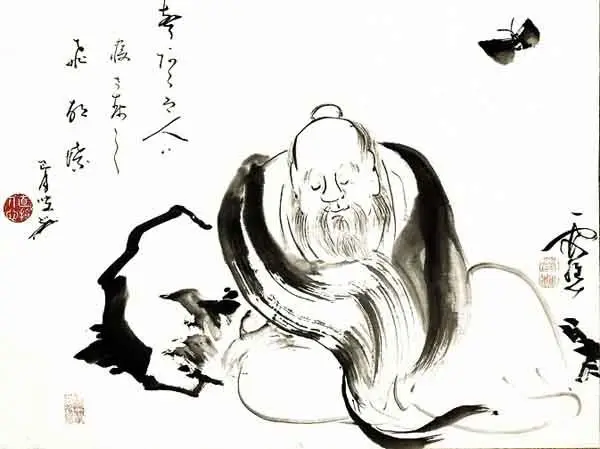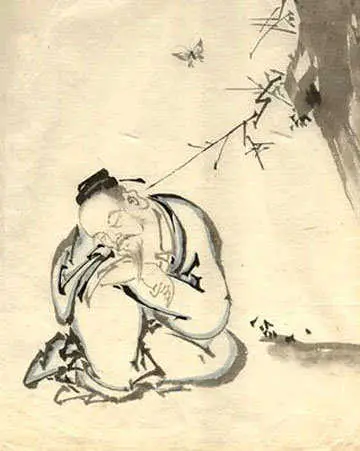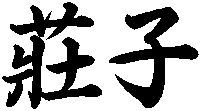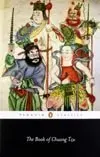|
Tao Te Ching
THE TAOISM OF LAO TZU
|
Chuang Tzu 28 The Taoist Text, Chapter 28
Kings who have wished to resign the Throne.1. Yâo proposed to resign the throne to Hsü Yü, who would not accept it. He then offered it to Tsze-kâu Kih-fû, but he said, "It is not unreasonable to propose that I should occupy the throne, but I happen to be suffering under a painful sorrow and illness. While I am engaged in dealing with it, I have not leisure to govern the kingdom." Now the throne is the most important of all positions, and yet this man would not occupy it to the injury of his life; how much less would he have allowed any other thing to do so! But only he who does not care to rule the kingdom is fit to be entrusted with it.
Shun proposed to resign the throne to Tsze-kâu Kih-po, who declined in the very same terms as Kih-fû had done. Now the kingdom is the greatest of all concerns, and yet this man would not give his life in exchange for the throne. This shows how they who possess the Tâo differ from common men. Shun proposed to resign the throne to Shan Küan, who said, "I am a unit in the midst of space and time. In winter I wear skins and furs; in summer, grass-cloth and linen; in spring I plough and sow, my strength being equal to the toil; in autumn I gather in my harvest, and am prepared to cease from labour and eat. At sunrise I get up and work; at sunset I rest. So do I enjoy myself between heaven and earth, and my mind is content:- why should I have anything to do with the throne? Alas! that you, Sir, do not know me better!" Thereupon he declined the proffer, and went away, deep among the hills, no man knew where. Shun proposed to resign the throne to his friend, a farmer of Shih-hû. The farmer, however, said (to himself), "How full of vigor does our lord show himself, and how exuberant is his strength! If Shun with all his powers be not equal (to the task of government, how should I be so?)." On this he took his wife on his back, led his son by the hand, and went away to the sea-coast, from which to the end of his life he did not come back. When Thâi-wang Than-fû was dwelling in Pin, the wild tribes of the North attacked him. He tried to serve them with skins and silks, but they were not satisfied. He tried to serve them with dogs and horses, but they were not satisfied, and then with pearls and jade, but they were not satisfied. What they sought was his territory. Thâi-wang Than-fû said (to his people), "To dwell with the elder brother and cause the younger brother to be killed, or with the father and cause the son to be killed,- this is what I cannot bear to do. Make an effort, my children, to remain here. What difference is there between being my subjects, or the subjects of those wild people? And I have heard that a man does not use that which he employs for nourishing his people to injure them." Thereupon he took his staff and switch and left, but the people followed him in an unbroken train, and he established a (new) state at the foot of mount Khì. Thus Thâi-wang Than-fû might be pronounced one who could give its (due) honour to life. Those who are able to do so, though they may be rich and noble, will not, for that which nourishes them, injure their persons; and though they may be poor and mean, will not, for the sake of gain, involve their bodies (in danger). The men of the present age who occupy high offices and are of honourable rank all lose these (advantages) again, and in the prospect of gain lightly expose their persons to ruin:- is it not a case of delusion? The people of Yüeh three times in succession killed their ruler, and the prince Sâu, distressed by it, made his escape to the caves of Tan, so that Yüeh was left without a ruler. The people sought for the prince, but could not find him, till (at last) they followed him to the cave of Tan. The prince was not willing to come out to them, but they smoked him out with moxa, and made him mount the royal chariot. As he took hold of the strap, and mounted the carriage, he looked up to heaven, and called out, "0 Ruler, 0 Ruler, could you not have spared me this?" Prince Sâu did not dislike being ruler;- he disliked the evil inseparable from being so. It may be said of him that he would not for the sake of a kingdom endanger his life; and this indeed was the reason why the people of Yüeh wanted to get him for their ruler.
The marquis Kâo-hsì said, "Good! Many have given me their counsel about this matter; but I never heard what you have said." Tsze-hwâ Tsze may be said to have known well what was of great importance and what was of little.
Yes; men like Yen Ho do of a truth dislike riches and honours. Hence it is said, "The true object of the Tâo is the regulation of the person. Quite subordinate to this is its use in the management of the state and the clan; while the government of the kingdom is but the dust and refuse of it." From this we may see that the services of the Tìs and Kings are but a surplusage of the work of the sages, and do not contribute to complete the person or nourish the life. Yet the superior men of the present age will, most of them, throw away their lives for the sake of their persons, in pursuing their (material) objects;- is it not cause for grief? Whenever a sage is initiating any movement, he is sure to examine the motive which influences him, and what he is about to do. Here, however, is a man, who uses a pearl like that of the marquis of Sui to shoot a bird at a distance of 10,000 feet. All men will laugh at him; and why? Because the thing which he uses is of great value, and what he wishes to get is of little. And is not life of more value than the pearl of the marquis of Sui?
In the end it did come about, that the people, on an occasion of trouble and disorder, put Tsze-yang to death.
The king (now) asked that the butcher should be introduced to him, but Yüeh said, "According to the law of Khû, great reward ought to be given to great service, and the recipient then be introduced to the king; but now my wisdom was not sufficient to preserve the kingdom, nor my courage sufficient to die at the hands of the invaders. When the army of Wû entered, I was afraid of the danger, and got out of the way of the thieves;- it was not with a distinct purpose (of loyalty) that I followed the king. And now he wishes, in disregard of the law, and violations of the conditions of our social compact, to see me in court;- this is not what I would like to be talked of through the kingdom." The king said to Tsze-khì, the Minister of War, "The position of the sheep-butcher Yüeh is low and mean, but his setting forth of what is right is very high; do you ask him for me to accept the place of one of my three most distinguished nobles." (This being communicated to Yüeh), he said, "I know that the place of such a distinguished noble is nobler than a sheep-butcher's stall, and that the salary of 10,000 kung is more than its profits. But how should I, through my greed of rank and emolument, bring on our ruler the name of an unlawful dispensation of his gifts? I dare not respond to your wishes, but desire to return to my stall as the sheep-butcher." Accordingly he did not accept (the proffered reward).
Tsang-tsze was residing in Wei. He wore a robe quilted with hemp, and had no outer garment; his countenance looked rough and emaciated; his hands and feet were horny and callous; he would be three days without lighting a fire; in ten years he did not have a new suit; if he put his cap on straight, the strings would break; if he drew tight the overlap of his robe, his elbow would be seen; in putting on his shoes, the heels would burst them. Yet dragging his shoes along, he sang the "Sacrificial Odes of Shang" with a voice that filled heaven and earth as if it came from a bell or a sounding stone. The Son of Heaven could not get him to be a minister; no feudal prince could get him for his friend. So it is that he who is nourishing his mind's aim forgets his body, and he who is nourishing his body discards all thoughts of gain, and he who is carrying out the Tâo forgets his own mind. Confucius said to Yen Hui, "Come here, Hui. Your family is poor, and your position is low; why should you not take office?" Hui replied, "I have no wish to be in office. Outside the suburban district I possess fields to the extent of fifty acres, which are sufficient to supply me with congee; and inside it I have ten acres, which are sufficient to supply me with silk and flax. I find my pleasure in playing on my lute, and your doctrines, Master, which I study, are sufficient for my enjoyment; I do not wish to take office." Confucius looked sad, changed countenance, and said, "How good is the mind of Hui! I have heard that he who is contented will not entangle himself with the pursuit of gain, that he who is conscious of having gained (the truth) in himself is not afraid of losing other things, and that he who cultivates the path of inward rectification is not ashamed though he may have no official position. I have long been preaching this; but to-day I see it realised in Hui:- this is what I have gained."
Mâu of Wei was the son of a lord of ten thousand chariots. For him to live in retirement among crags and caves was more difficult than for a scholar who had not worn the dress of office. Although he had not attained to the Tâo, he may be said to have had some idea of it.
When they came in, Tsze-lû said, "Your present condition may be called one of extreme distress." Confucius replied, "What words are these! When the Superior man has free course with his principles, that is what we call his success; when such course is denied, that is what we call his failure. Now I hold in my embrace the principles of benevolence and righteousness, and with them meet the evils of a disordered age;- where is the proof of my being in extreme distress? Therefore looking inwards and examining myself, I have no difficulties about my principles; though I encounter such difficulties (as the present), I do not lose my virtue. It is when winter's cold is come, and the hoar-frost and snow are falling, that we know the vegetative power of the pine and cypress. This strait between Khan and Tshâi is fortunate for me." He then took back his lute so that it emitted a twanging sound, and began to play and sing. (At the same time) Tsze-lû, hurriedly, seized a shield, and began to dance, while Tsze-kung said, "I did not know (before) the height of heaven nor the depth of the earth." The ancients who had got the Tâo were happy when reduced to extremity, and happy when having free course. Their happiness was independent of both these conditions. The Tâo, and its characteristics!- let them have these and distress and success come to them as cold and heat, as wind and rain in the natural order of things. Thus it was that Hsü Yû. found pleasure on the north of the river Ying, and that the earl of Kung enjoyed himself on the top of mount (Kung).
When Thang was about to attack Kieh, he took counsel with Pien Sui, who said, "It is no business of mine." Thang then said, "To whom should I apply?" And the other said, "I do not know." Thang then took counsel with Wû Kwang, who gave the same answer as Pien Sui; and when asked to whom he should apply, said in the same way, "I do not know." "Suppose," Thang then said, "I apply to Î Yin, what do you say about him?" The reply was, "He has a wonderful power in doing what is disgraceful, and I know nothing more about him!" Thang thereupon took counsel with Î Yin, attacked Kieh, and overcame him, after which he proposed to resign the throne to Pien Sui, who declined it, saying, "When you were about to attack Kieh, and sought counsel from me, you must have supposed me to be prepared to be a robber. Now that you have conquered Kieh, and propose to resign the throne to me, you must consider me to be greedy. I have been born in an age of disorder, and a man without principle twice comes, and tries to extend to me the stain of his disgraceful proceedings!- I cannot bear to hear the repetition of his proposals." With this he threw himself into the Kâu water and died. Thang further made proffer of the throne to Wû Kwang, saying, "The wise man has planned it; the martial man has carried it through; and the benevolent man should occupy it:- this was the method of antiquity. Why should you, Sir, not take the position?" Wû Kwang refused the proffer, saying, "To depose the sovereign is contrary to right; to kill the people is contrary to benevolence. When another has encountered the risks, if I should accept the gain of his adventure, I should violate my disinterestedness. I have heard it said, "If it be not right for him to do so, one should not accept the emolument; in an age of unprincipled (government), one should not put foot on the soil (of the) country:"- how much less should I accept this position of honour! I cannot bear to see you any longer." And with this he took a stone on his back, and drowned himself in the Lü water.
The two princes then went north to the hill of Shâu-yang, where they died of starvation. If men such as they, in the matter of riches and honours, can manage to avoid them, (let them do so); but they must not depend on their lofty virtue to pursue any perverse course, only gratifying their own tendencies, and not doing service in their time:- this was the style of these two princes. 
Chuang Tzu
 The Book of Chuang TzuA modern translation of Chuang Tzu, by Martin Palmer and Elizabeth Breuilly.See the book at Amazon
About CookiesMy Other Websites:I Ching OnlineThe 64 hexagrams of the Chinese classic I Ching and what they mean in divination. Try it online for free.
Qi Energy ExercisesThe ancient Chinese life energy qi (chi) explained, with simple instructions on how to exercise it.
Life EnergyThe many ancient and modern life force beliefs all over the world explained and compared.
Taoismen på svenska
Other Books by Stefan StenuddClick the image to see the book at Amazon (paid link).
The Greek philosophers and what they thought about cosmology, myth, and the gods. |
 Tao Te Ching
Tao Te Ching Tao Quotes
Tao Quotes Fake Lao Tzu Quotes
Fake Lao Tzu Quotes Cosmos of the Ancients
Cosmos of the Ancients Qi — Increase Your Life Energy
Qi — Increase Your Life Energy Aikido Principles
Aikido Principles Life Energy Encyclopedia
Life Energy Encyclopedia Archetypes of Mythology
Archetypes of Mythology Stefan Stenudd
Stefan Stenudd